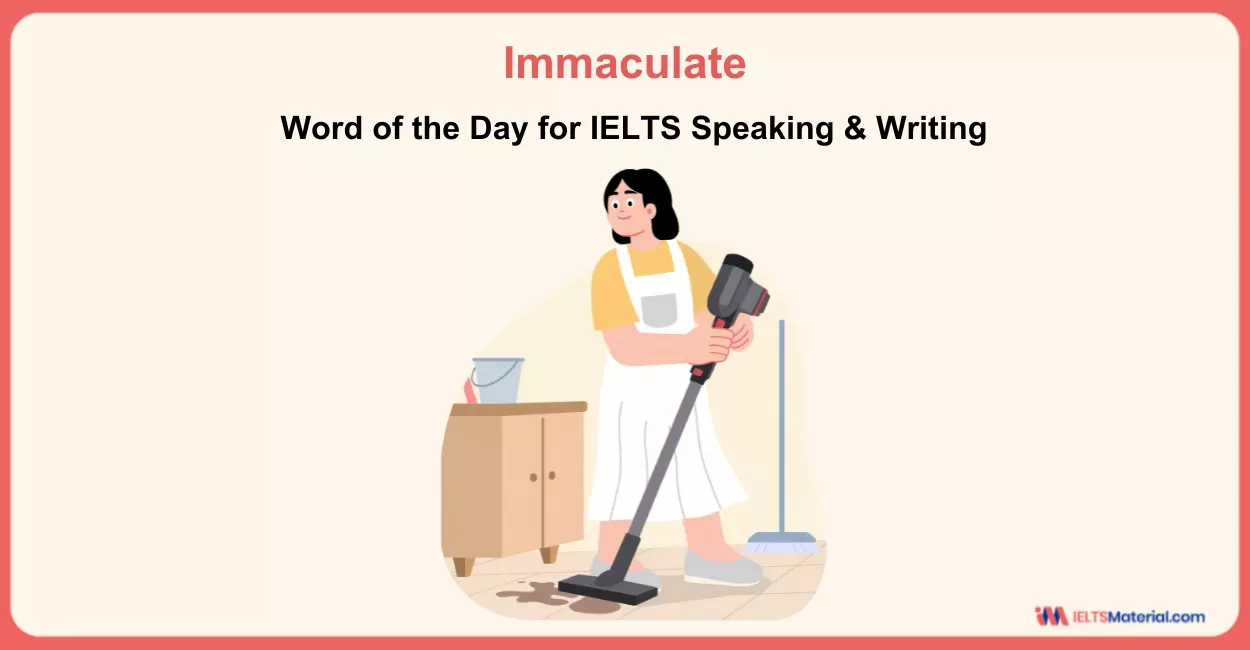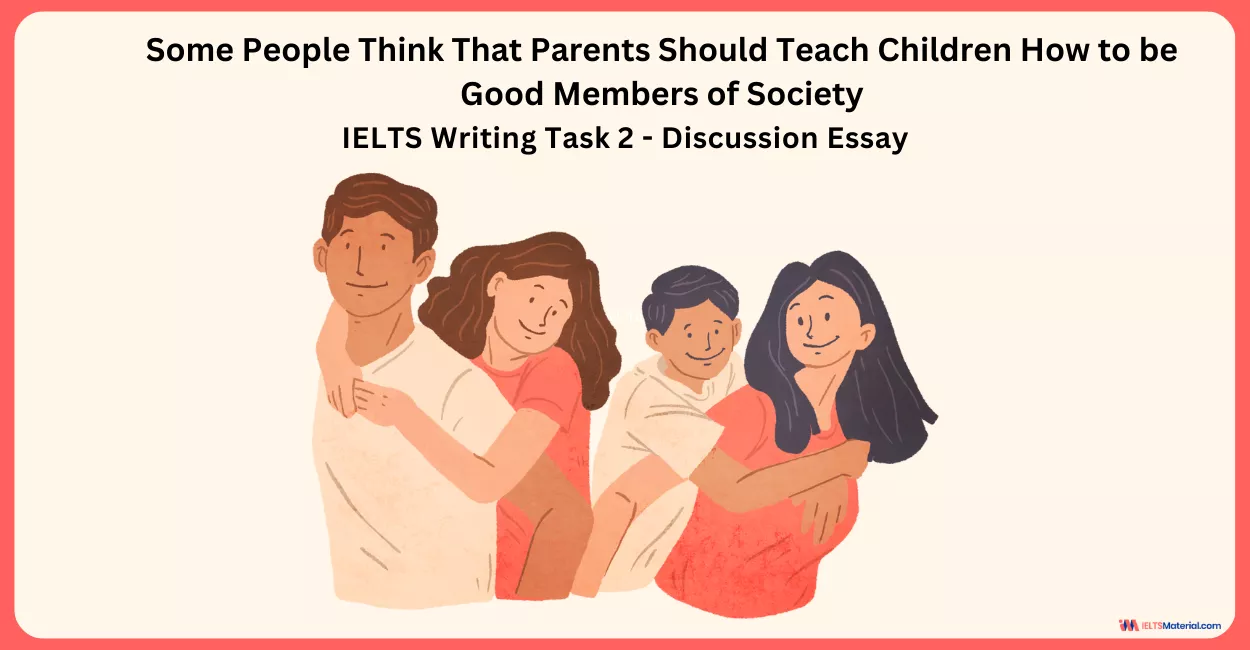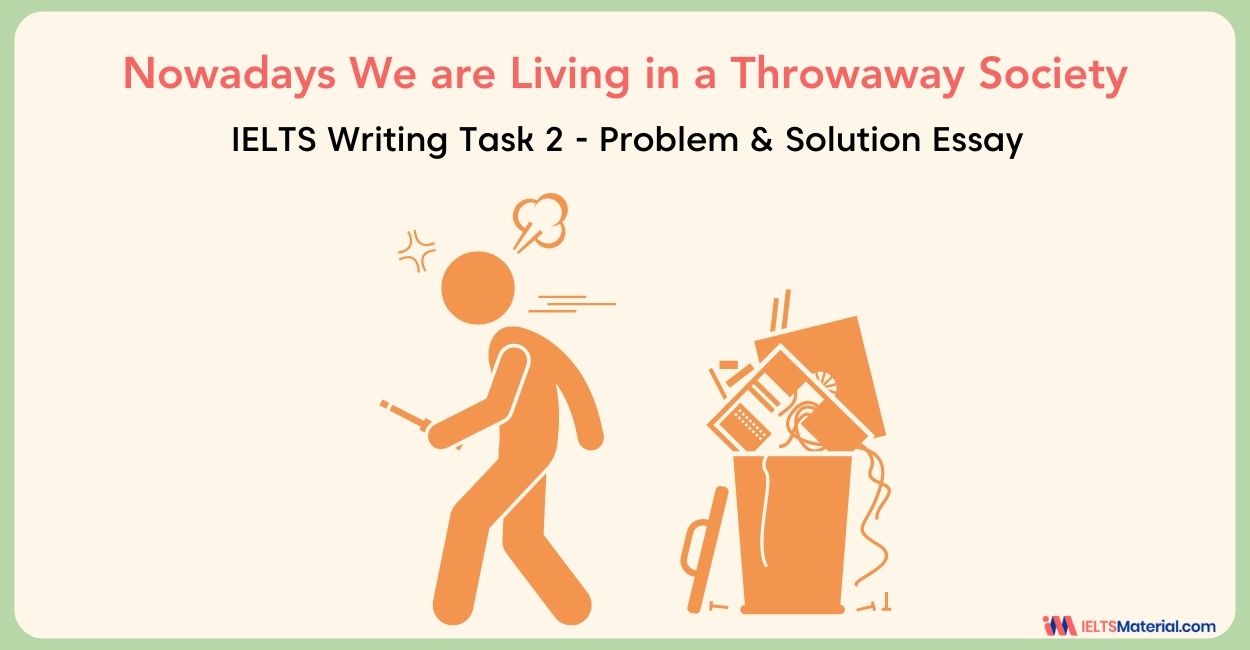Nowadays We are Living in a Throwaway Society – IELTS Writing Task 2
Looking to ace IELTS Writing? Browse Band 7-9 sample answers for "Nowadays We Are Living in a Throwaway Society" and boost your vocabulary to craft a standout essay!
Table of Contents
- Question
- Band 7 Sample Answer for Writing Task 2 Question – Nowadays We are Living in a Throwaway Society
- Band 8 Sample Answer for Writing Task 2 Question – Nowadays We are Living in a Throwaway Society
- Band 9 Sample Answer for Writing Task 2 Question – Nowadays We are Living in a Throwaway Society
- IELTS Writing Task 2 Connectors for Gaining Bonus Points in the Sample Answers for IELTS Writing Task 2 Question – Nowadays We are Living in a Throwaway Society
- Additional Study Resources

Try AI Essay Checker for Instant Band Score
Achieving proficiency in the Essay Writing section of the IELTS Writing module poses a difficulty for numerous test-takers. Hence, it is essential to enhance your essay writing abilities by practising essay topics like Nowadays We are Living in a Throwaway Society, before undertaking the IELTS Writing Task 2 to ensure success.
The IELTS essay topic- Nowadays We are Living in a Throwaway Society – is a Problem Solution Essay. Usually, this kind of essay questions pose an issue and wants you to list some typical issues that are related to the topic as well as a few possible solutions with appropriate examples. If you want to practise similar essays, have a look at the Writing Task 2 practice tests.
A significant number of IELTS candidates encounter difficulties when it comes to the Essay Writing section of the IELTS Writing Module. As a result, we have provided expert-curated Band 7, 8 & 9 sample answers on the topic – Nowadays We are Living in a Throwaway Society- for you to fine-tune your essay writing skills prior to embarking on the IELTS journey.
Let’s have a look at the IELTS Problem Solution Essay – Nowadays We are Living in a Throwaway Society.
Question
You should spend about 40 minutes on this task.
Nowadays, we are living in a throwaway society that is driven by excessive consumerism, waste and single use of products. What are the reasons behind this development? What could be done to address the problems associated with a throw-away society?
Give reasons for your answer and include any relevant examples from your own knowledge or experience.
Write at least 250 words.
Outline
Type of Essay:
Structure Breakdown:
|
Book a FREE trial, chat with our experts NOW, and ace your IELTS journey!
Band 7 Sample Answer for Writing Task 2 Question – Nowadays We are Living in a Throwaway Society
In today’s world, people are rooted in a throwaway society characterized by uncontrollable consumerism, excessive waste, and the common use of single-use products. This development is associated with several connected factors, which will be discussed in this essay, along with some probable solutions.
Firstly, the rise of fast fashion and electronic devices has contributed to a culture of disposable goods. With constant product innovations, like iPhones, and short-lived trends, consumers are attracted to abandon items quickly in search of the latest styles or technological advancements. Secondly, the convenience of single-use products has become deeply implanted in our daily lives. Items like plastic bottles, disposable utensils, and packaging contribute significantly to environmental degradation. Lastly, a lack of awareness about the long-term consequences, coupled with the convenience factor, has led to a throwaway mindset.
To begin with, educating individuals about the environmental impact of their choices can inspire more eco-friendly practices. Moreover, governments and businesses play a central role in promoting environmentally friendly options and implementing restrictions that discourage excessive waste. In addition, efforts to promote a circular economy, where products are designed for endurance, repairability, and recyclability, can also make an extraordinary difference. Companies like Patagonia, known for their commitment to the above-mentioned factors, serve as positive examples. Therefore, a change in consumer behavior is essential to manage these issues caused by a throwaway society.
In conclusion, changing the trend of a throwaway society needs a joint effort. We can move towards a more environmentally conscious and enduring way of life by spreading awareness, encouraging responsible consumer choices, and increasing eco-friendly practices.
Vocabulary
- Rooted (Verb)
Meaning: having developed from something
E.g.: His hate for drunk men was rooted in the fact that his father was a drunkard.
- Uncontrollable (Adjective)
Meaning: not able to be controlled
E.g.: The crowd became uncontrollable at seeing Taylor Swift perform.
- Probable (Adjective)
Meaning: likely to be true or likely to happen
E.g.: The probable cause of this infection is unhygienic living conditions.
- Disposable (Adjective)
Meaning: designed for or capable of being thrown away after being used or used up
E.g.: Do not throw away the unused disposable cups.
- Implanted (Verb)
Meaning: to fix ideas, feelings, or opinions in someone else’s mind
E.g.: He implanted wrong ideas in the mind of his teammates.
- Degradation (Noun)
Meaning: the act or process of damaging or ruining something
E.g.: Deforestation causes soil erosion and degradation.
- Coupled with (Phrasal Verb)
Meaning: to join or combine (something) with (something else)
E.g.: Benny, coupled with a few more boys, beat up the thief.
- Endurance (Noun)
Meaning: the ability to continue with an unpleasant or difficult situation, experience, or activity over a long period of time
E.g.: This activity will test the endurance of the soldiers.
- Repairability (Noun)
Meaning: a measure of the degree to and ease with which a product can be repaired and maintained, usually by end consumers
E.g.: This watch has gone beyond repairability.
- Recyclability (Noun)
Meaning: capability of being reusable at the end of its useful life to minimize waste, pollution, and resource use
E.g.: Recyclability is one of the important factors while choosing a product nowadays.
Come learn proven tips for handling IELTS Writing in our IELTS webinars! Explore Now!
Band 8 Sample Answer for Writing Task 2 Question – Nowadays We are Living in a Throwaway Society
In recent times, our society has become associated with a throwaway culture driven by the persistent growth of consumerism, generating alarming levels of waste and dependence on single-use products. Several societal, economic, and cultural factors collectively led to this mindset and have challenged the acceptance of eco-friendly practices. This essay explores the factors behind the development of this throwaway society and examines possible strategies to address the trend.
In the first place, globalization has led to the production and consumption of goods on a massive scale. Mass production techniques have made producing large quantities of products easier and cheaper, such as disposable packaging and containers, contributing to environmental pollution due to their widespread use and improper disposal. Next, the desire for convenience in our fast-paced lifestyles has led to a preference for disposable and single-use items. Easy-use and non-reusable products, like plastic water bottles, are convenient and have become more appealing in a society where time is precious. Additionally, many consumers are not fully aware of their purchasing decisions’ environmental and social consequences. Lack of education and awareness about the impact of one-use products can contribute to a continued cycle of overconsumption.
Talking about the effectual measures that can be taken to bring about a positive change in people’s mindset and product use would be to curb the causes themselves. Government intervention can be crucial in legislation restricting single-use plastics and promoting recycling. For instance, countries like Sweden have implemented policies to reduce landfill waste, emphasizing recycling and waste-to-energy programs. Also, education is key; informing consumers about the environmental impact of their choices can lead to more responsible decisions. Simultaneously, a cultural shift towards valuing quality over quantity is essential. Brands like Apple, focusing on device longevity and repairability, showcase the potential for ethical business practices.
To sum up, demand for single-use products, uninformed consumer behavior and mass production have fuelled this throwaway culture. As a result, it is the combined duty of individuals and the government to choose sensible options and prevent further degradation of the environment. (339 words)
Vocabulary
- Persistent (Adjective)
Meaning: lasting for a long time or difficult to get rid of
E.g.: Manna was quite persistent in her efforts and won the election.
- Mindset (Noun)
Meaning: a person’s way of thinking and their opinions
E.g.: How you behave with other people depends on your mindset.
- Globalization (Noun)
Meaning: the process of interaction and integration among people, companies, and governments worldwide
E.g.: Globalization has brought the world within our grasp.
- Appealing (Adjective)
Meaning: attractive or interesting
E.g.: The dress that I bought for prom was quite appealing,
- Overconsumption (Noun)
Meaning: the state or an instance of consuming too much food, drink, fuel , etc
E.g.: Overconsumption of food is not a healthy habit.
- Effectual (Adjective)
Meaning: effective and successful
E.g.: The tricks that he shared for solving the problem were effectual.
- Curb (Verb)
Meaning: to control or limit something that is not wanted
E.g.: You should curb your sugar intake.
- Intervention (Noun)
Meaning: the act of interfering with the outcome or course especially of a condition or process
E.g.: The group required an intervention after their tantrum at the party.
- Ethical (Adjective)
Meaning: relating to beliefs about what is morally right and wrong
E.g.: The most ethical thing to do is to surrender the child to the police.
- Fuelled (Verb)
Meaning: to provide with energy
E.g.: Anger fuelled his action towards the Mayor.
Take your IELTS Writing Task 2 to the next level with our exclusive study material!
Band 9 Sample Answer for Writing Task 2 Question – Nowadays We are Living in a Throwaway Society
Unlock Answer
First and foremost, consumer culture fosters a lifestyle centered around constantly acquiring new goods, often influenced by advertising. Regular updates and new releases of smartphones, laptops, and other electronic gadgets are often accompanied by marketing campaigns emphasizing the latest features. This creates a fear of missing out (FOMO), which leads to unwarranted shopping and throwaway. Besides a lack of awareness, companies are responsible for this trend as they design products with a limited lifespan to encourage consumers to replace them regularly. For instance, many electronic devices, such as smartphones and laptops, are designed with non-replaceable batteries or limited upgrade options, driving consumers to buy new models when their devices become outmoded or experience battery deterioration.
Addressing these issues requires a concerted effort. Primarily, governments can enact regulations to limit single-use plastics and encourage sustainable practices. An exemplary case is the European Union’s ban on single-use plastic items, targeting products like plastic cutlery and straws to reduce environmental harm. Furthermore, consumer awareness and education are crucial components of the solution. The “Refill” campaign in the UK encourages people to use refillable water bottles, reducing reliance on single-use plastic bottles. Likewise, companies can also play a role in shifting away from a throwaway culture. Brands like Patagonia promote sustainability through initiatives like their Worn Wear program, coaxing customers to buy used items and repair clothing rather than constantly purchasing new products.
In short, combating the throwaway society involves a combination of regulatory measures, consumer education, and corporate responsibility. By learning from successful examples, such as the EU’s plastic ban, the Refill campaign, and initiatives by environmentally conscious brands, we can work towards a more sustainable and cognizant approach to consumption. (335 words)
Vocabulary
- Omnipresence (Noun)
Meaning: the fact of being present or having an effect everywhere at the same time
E.g.: Omnipresence is not a quality a human being should possess.
- Propelling (Verb)
Meaning: to cause something to move forward
E.g.: The propelling force of the case was the revelation of the last witness.
- Mitigate (Verb)
Meaning: to make something less harmful, unpleasant, or bad
E.g.: Will this step mitigate the problem?
- Unwarranted (Adjective)
Meaning: lacking a good reason; unnecessary
E.g.: Availability of unwarranted money led to his downfall.
- Lifespan (Noun)
Meaning: the length of time for which something exists or lasts
E.g.: The lifespan of a dog is 15 to 20 years.
- Outmoded (Adjective)
Meaning: no longer modern, useful, or necessary
E.g.: The outmoded model of the engine led to overconsumption of fuel.
- Concerted (Adjective)
Meaning: planned or done together for a shared purpose
E.g.: The concerted effort of the community and the police helped them to catch the killer.
- Exemplary (Adjective)
Meaning: serving as a desirable model; very good
E.g.: Raina is an exemplary student and all the teachers are proud of her.
- Coaxing (Verb)
Meaning: to persuade someone gently to do something or go somewhere
E.g.: The child’s coaxing tone made his parents buy him the toy.
- Cognizant (Adjective)
Meaning: having knowledge or awareness
E.g.: He saw the man in front of him and became cognizant of his motive.
IELTS Writing Task 2 Connectors for Gaining Bonus Points in the Sample Answers for IELTS Writing Task 2 Question – Nowadays We are Living in a Throwaway Society
Check out the list of connectors used in the above-given sample answers that will help you add coherence to your writing and earn points for your IELTS Writing Task 2 – Nowadays We are Living in a Throwaway Society.
- Firstly
- Secondly
- Lastly
- To begin with
- Moreover
- Therefore
- In conclusion
- In recent times
- In the first place
- Next
- Additionally
- For instance
- Also
- Simultaneously
- To sum up
- As a result
- First and foremost
- Besides
- Primarily
- Furthermore
- Likewise
- In short
Additional Study Resources
- Some People Claim that Not Enough of the Waste from Homes is Recycled Sample Essays
- Most Countries Do Not Recycle their Waste – IELTS Writing Task 2
- Can you use Quotes or Idioms in your IELTS Essay?
- Nowadays We are Producing More and More Rubbish – IELTS Writing Task 2
- In Many Countries People Do not Recycle Waste Materials- IELTS Writing Task 2
- Nowadays In Many Countries Household Waste-IELTS Writing Task 2
Practice IELTS Writing Task 2 based on Essay types

Start Preparing for IELTS: Get Your 10-Day Study Plan Today!
Explore other IELTS Articles

Kasturika Samanta

Haniya Yashfeen
Recent Articles

Haniya Yashfeen


Prity Mallick

Kasturika Samanta






Post your Comments